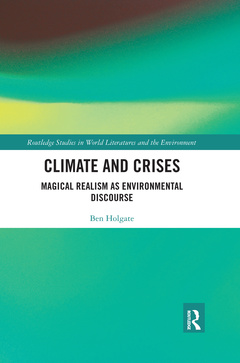Description
Climate and Crises
Magical Realism as Environmental Discourse
Routledge Studies in World Literatures and the Environment Series
Author: Holgate Ben
Language: English
Subjects for Climate and Crises:
Keywords
Magical Realist Fiction; Young Men; ecocriticism; Magical Realist; global canon; Huon Pine; magical realism; Sea Waters; Magical Realist Elements; Australasia; Humpback Whale; China; Magical Realist Text; geographic bias; Swan Book; biocentric perspective; Calcutta Chromosome; prospect of extinction; Gould’s Book; climate change; Trash Vortex; literature; River Guide; Asia; Red Sorghum; environmental; Compound Eyes; crises; Indigenous Tasmanians; crisis; Bone People; climate; Sarah Island; discourse; Bull Whale; Historiographic Metafiction; Franklin River; Classical Chinese Literature; Sorghum Fields; Rainbow Serpent; Contemporary Chinese Fiction
Publication date: 09-2020
· 15.2x22.9 cm · Paperback
Publication date: 02-2019
· 15.2x22.9 cm · Hardback
Description
/li>Contents
/li>Readership
/li>Biography
/li>
Climate and Crises: Magical Realism as Environmental Discourse makes a dual intervention in both world literature and ecocriticism by examining magical realism as an international style of writing that has long-standing links with environmental literature. The book argues that, in the era of climate change when humans are facing the prospect of species extinction, new ideas and new forms of expression are required to address what the novelist Amitav Gosh calls a "crisis of imagination." Magical realism enables writers to portray alternative intellectual paradigms, ontologies and epistemologies that typically contest the scientific rationalism derived from the European Enlightenment, and the exploitation of natural resources associated with both capitalism and imperialism. Climate and Crises explores the overlaps between magical realism and environmental literature, including their respective transgressive natures that dismantle binaries (such as human and non-human), a shared biocentric perspective that focuses on the inter-connectedness of all things in the universe, and, frequently, a critique of postcolonial legacies in formerly colonised territories. The book also challenges conventional conceptions of magical realism, arguing they are often influenced by a geographic bias in the construction of the orthodox global canon, and instead examines contemporary fiction from Asia (including China) and Australasia, two regions that have been largely neglected by scholarship of the narrative mode. As a result, the monograph modifies and expands our ideas of what magical realist fiction is.
Introduction: A crisis of imagination
Chapter One:
‘Expanded reality’: Alexis Wright’s revitalisation of Dreamtime narratives
Chapter Two:
Sublime wilderness: Embracing the non-human in Richard Flanagan’s Tasmania
Chapter Three:
‘The oneness is still with us’: Oceanic mythology in Witi Ihimaera’s The Whale Rider
Chapter Four:
‘Heart, spirit, and inclination:’ Reconciliation in Keri Hulme’s The Bone People
Chapter Five:
Mosquitoes and malaria: Counter-science and colonial archives in Amitav Ghosh’s The Calcutta Chromosome
Chapter Six:
Purity and parody: Mo Yan’s resistance to Western magical realism in pursuit of his own Chinese style
Chapter Seven:
Planetary perspective: Addressing climate change in Wu Ming-yi’s The Man with the Compound Eyes
Conclusion
Ben Holgate is a Leverhulme Early Career Fellow in the Department of Comparative Literature at Queen Mary University of London. Previously, he was Associate Lecturer in the Department of English and Related Literature at the University of York. He holds a Doctor of Philosophy in English from the University of Oxford.




